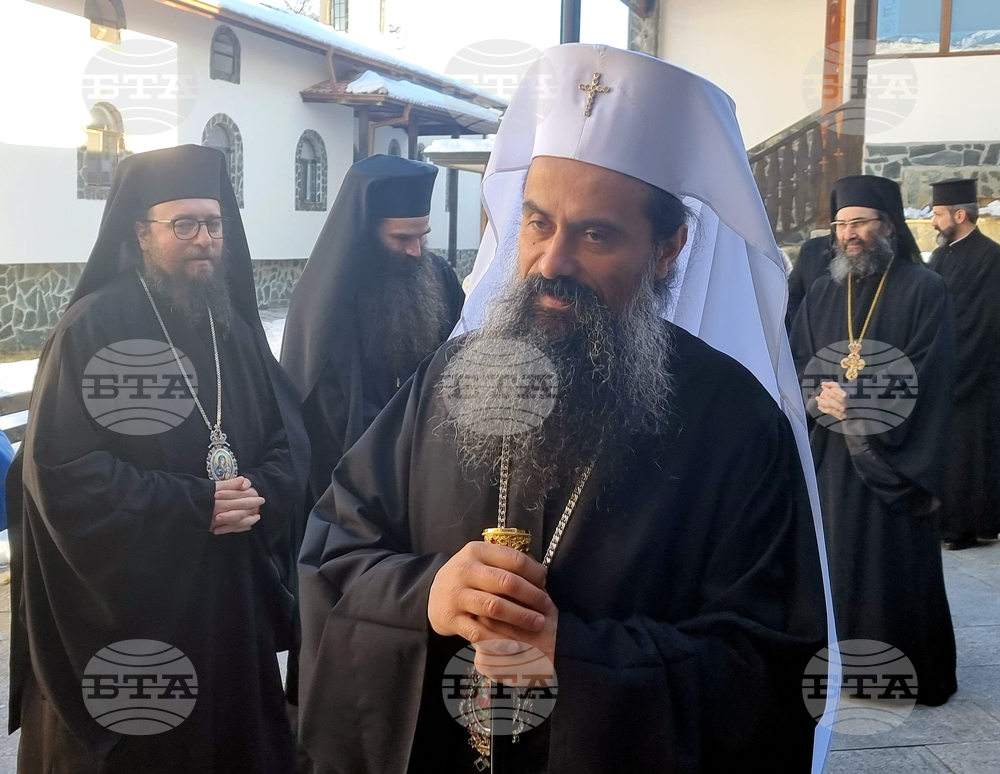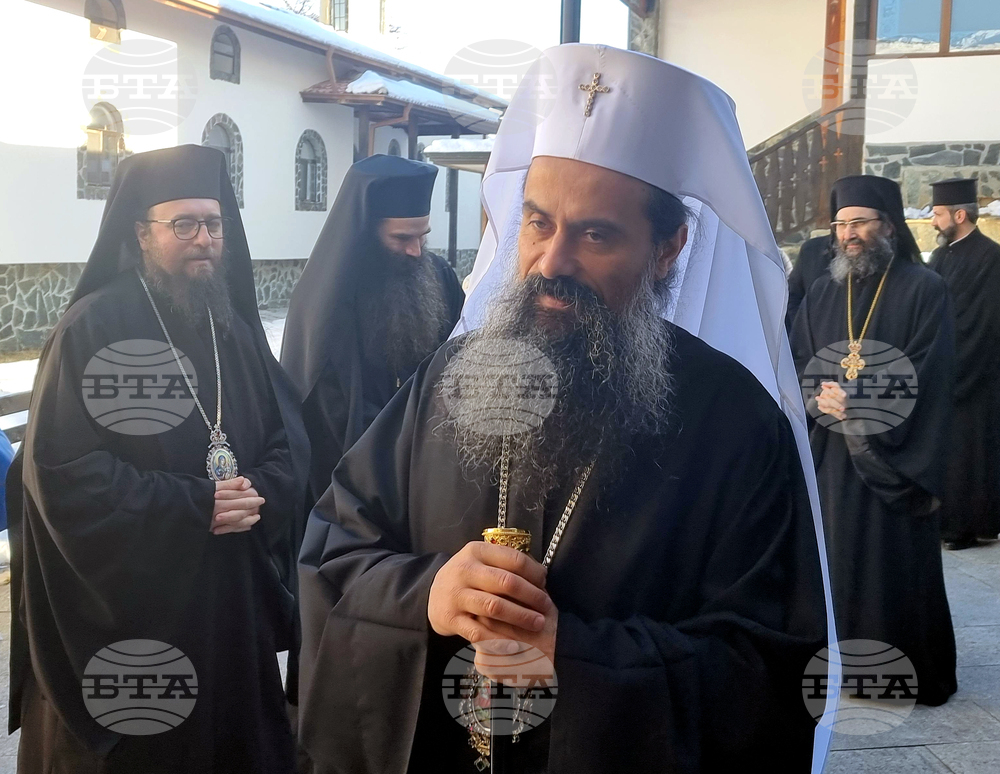site.btaUPDATED Patriarch Daniil: "There Is Only One Orthodox Church"


"According to the rules of the church, there cannot be two Orthodox churches in a single place, within a single canonical territory," Bulgarian Patriarch Daniil told journalists during a visit to the Protecting Veil of the Theotokos Convent near the village of Resilovo (Southwestern Bulgaria) on Sunday, BTA's correspondent in Kyustendil Yaroslav Stavrev reports.
The Patriarch was commenting on a final judgment of mid-December by which the Supreme Court of Cassation entered the Old Calendar Orthodox Church of Bulgaria (OCOCB) into the Register of Religious Denominations with the Sofia City Court.
In His Holiness's words, the Religious Denominations Act states that Eastern Orthodoxy is the traditional religion in Bulgaria and the exponent of this denomination is the Bulgarian Orthodox Church - Bulgarian Patriarchate.
Patriarch Daniil said he was perplexed by the judgment and recalled that back in 2012, when registration was attempted, the [Sofia City] Court approached the Religious Denominations Directorate which asked the Holy Synod for an expert opinion.
The expert opinion in question argued that no other church but the Bulgarian Orthodox Church could use the word "Orthodox" in its name, and that only the Bulgarian Orthodox Church, rather than self-proclaimed Orthodox communities, could represent Eastern Orthodoxy in Bulgaria. The OCOCB could not therefore pretend to be Orthodox, but there would be no bar to its registration as "Bulgarian Old Calendar Church", without using the word "Orthodox".
"The [Supreme] Court [of Cassation] was able to familiarize itself with this opinion, which points out that this case cannot be treated in a way similar to commercial corporations, where a slight variation in the corporate name is not an impediment to registration. In the case at issue, there is a confusion of legal persons," the Patriarch commented, adding that by law the Bulgarian Orthodox Church is inextricably bound with the One Holy, Catholic and Apostolic Church, i.e. it is in canonical communion with the rest of the local Orthodox churches, which is a condition for a church to be Orthodox.
"This judgment seems to be taking us years back, to the time of the rift. The Bulgarian Orthodox Church then went through the ordeal of explaining to the State that only a church that is in intercommunion with the rest of the Orthodox churches can be an Orthodox church. That was the purpose of convening the Pan-Orthodox Council in 1998," Daniil added, noting that he was dismayed why, how and for what reason that judgment was rendered.
The Holy Extended Pan-Orthodox Over-jurisdictional Council that he mentioned met in Sofia on September 30 and October 1, 1998. It was initiated and chaired by Oecumenical Patriarch Bartholomew I and consisted of 11 heads of local Orthodox churches. The Convention decided to absolve all repenting dissenters who adhered to an alternative synod. The dissenting synod had been set up in 1992 by a faction in the church which challenged the legitimacy of the Holy Synod under Patriarch Maksim and was backed by the government of the Union of Democratic Forces.
Decades-Long Legal Battle
The Old Calendar Orthodox Church of Bulgaria traces its beginnings to 1968, when the Bulgarian Orthodox Church decided to switch from the Julian Calendar to the Revised Julian Calendar. Some of the clergy and adherents of the Bulgarian Orthodox Church disagreed with the abandonment of the Julian Calendar. There were also divergences over other doctrinal and canonical points, as well as with respect to the degree of autonomy of the church vis-a-vis the communist regime. As a result, the "Old Calendarists", mostly centred on a convent in Knyazhevo (on the outskirts of Sofia) disaffiliated themselves from the Bulgarian Orthodox Church, which in turn disavowed them.
In 1993 the OCOCB applied for registration to the Religious Denominations Directorate. The request was left without a formal reply. By 2013 that church had 24 priests and about 2,000 adherents. In the absence of legal personality, it could not erect or own places of worship and was unable to receive donations, formally employ its clergy, or carry on business related to its religious practices.
In February 2012 the Sofia City Court refused to register the OCOCB, holding that the applicant church could not have a name identical to that of the Bulgarian Orthodox Church or use its assets, and it was beyond doubt that its name was identical.
The OCOCB appealed that refusal of registration, submitting that the Religious Denominations Act prohibited the simultaneous registration of religious denominations with truly identical names but did not bar the registration of more than one religious community from the same denomination and arguing that many Evangelical, Baptist and other churches from one and the same denomination had already been registered. The Sofia Appellate Court upheld that refusal on April 23, 2012. In a final ruling of March 29, 2013, the Supreme Court of Cassation refused to admit the appeal for examination.
The OCOCB then applied to the European Court of Human Rights (ECtHR) which, by a judgment dated April 20, 2021, held that the right of the applicant church's adherents to freedom of religion and to an effective remedy had been violated. The ECtHR awarded the applicant EUR 20,180 in pecuniary and non-pecuniary damages and costs and expenses.
In November 2022, the Sofia City Court again refused an application for registration of the OCOCB, and in February 2023 the Sofia Appellate Court left that refusal standing.
Acting on a cassation appeal against the intermediate-appellate-review judgment, the Supreme Court of Cassation held on December 16, 2024 that the expression "Old Calendar" included in the name is sufficiently distinctive of the newly established religious institution and also expresses the differences of the religious community with respect to the religious feasts. The Court rejected the argument that recognition by the Bulgarian Orthodox Church - Bulgarian Patriarchate and the rest of the local Eastern Orthodox churches can be inferred as a condition for the registration of another Eastern Orthodox religious institution. The Supreme Court judgment states that a registration of the cassation appellant could not possibly affect any rights of the Bulgarian Orthodox Church - Bulgarian Patriarchate and its adherents. "That religious institution, while existing for centuries, has undoubtedly shared in the consolidation of Bulgarian national spirit and statehood and at present brings together the majority of Orthodox Christians in this country. It is monolithic and authoritative and enjoys the exclusive respect of institutions and society. At the same time, the requested registration is for a small religious community which has existed for 30 years and does not lay any claims to the internal organization and the assets of the Bulgarian Orthodox Church - Bulgarian Patriarchate," the Court concluded, effecting the entry of a religious institution named "Old Calendar Orthodox Church of Bulgaria" into the Register of Religious Denominations with the Sofia City Court.
Parties' Reaction
The Supreme Court judgment was criticized by two political entities represented in Parliament.
On December 27, the Vazrazhdane party said in a Facebook post that they will immediately draft an amendment to the Religious Denominations Act reserving the right to use the expression "Bulgarian Orthodox Church" for the Bulgarian Patriarchate and expressly specifying that no other religious organizations can use that expression, with or without any added words or word combinations. The party pledged to table the bill on the earliest possible day of legislative business - December 30.
"Patriarch Daniil's election has shocked the American midwives of the Phanariot lobby in Bulgaria, and the all-nation's support for him has additionally induced in them an open infuriation out of spite and helplessness. So, as it can be seen, they promptly organized an assault against the church," Vazrazhdane commented.
On December 28, the BSP-United Left Coalition described the Supreme Court's judgment as an "unprecedented encroachment" and a "severe blow to Orthodox Christianity in Bulgaria" and firmly insisted that "the registration of a second Orthodox church is ushering in a new rift".
"There is no second Catholic church in the world. Nor are there any such precedents in the other denominations. This leads us to conclude that such a judgment is intended to legitimize a new rift in the church with the clear and visible support of the European Court of Human Rights, after the categorical refusal of registration on the part of the Bulgarian courts in recent years," BSP-United Left commented.
On December 29, GERB Party leader Boyko Borisov wrote on Facebook that during a meeting Sunday with Patriarch Daniil he had told him that Eastern Orthodoxy is the traditional religion in Bulgaria and its only exponent and representative is the Bulgarian Orthodox Church, which is a member of the One Holy, Catholic and Apostolic Church. Borisov recalls that this is also stated in the effective provisions of the Religious Denominations Act.
/LG/
news.modal.header
news.modal.text